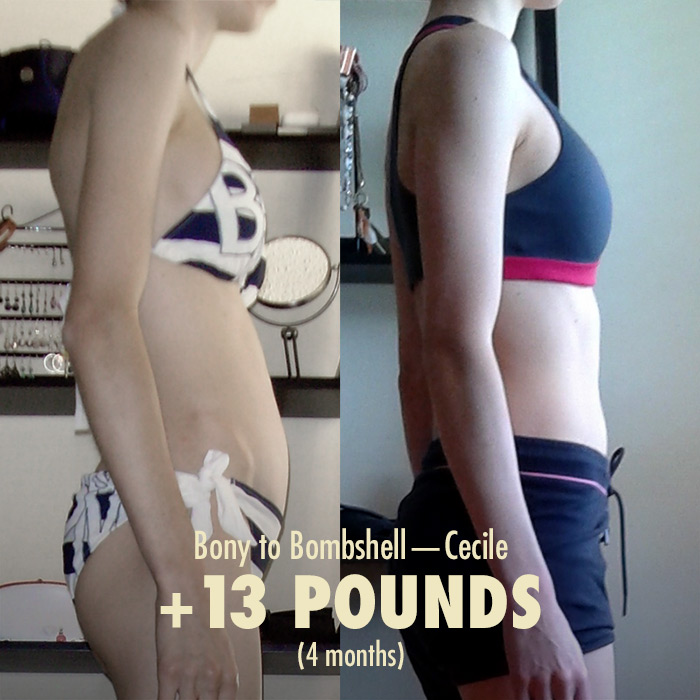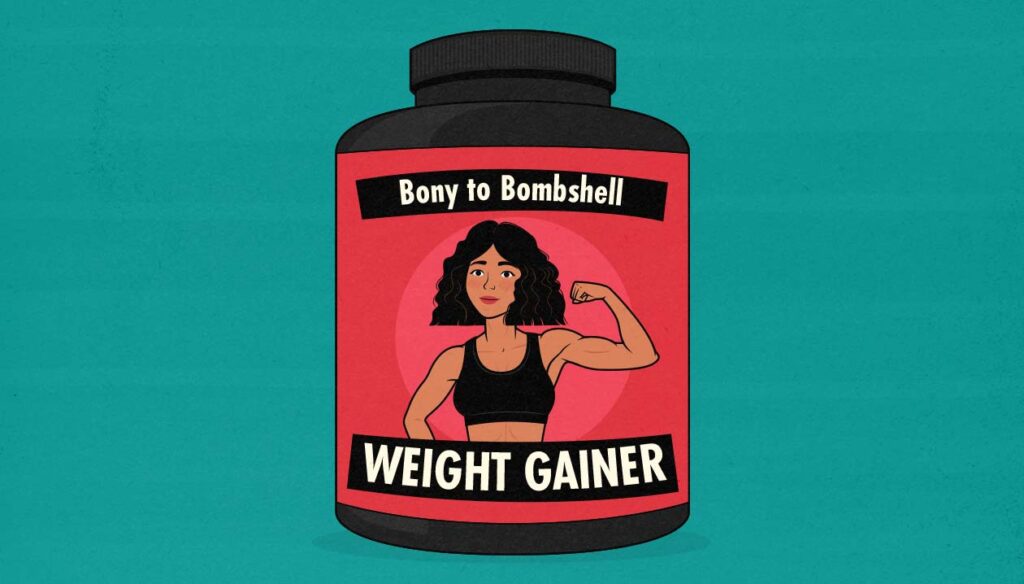
Best Weight Gainer Supplements For Skinny Women
Weight gainers, also known as mass gainers, are high-calorie supplements designed to help naturally skinny women gain weight. They’re almost always made of protein powder, carb powder, and some flavouring to make them more palatable.
The idea is that by drinking all of these calories, you can gain weight more easily. Weight-gainer shakes aren’t as filling as real food, don’t need to be cooked, and can be chugged in a few seconds flat. No wonder they’re so popular.
But do they work? Should you use them? Are there any downsides or side effects? And what kind of results can you expect if you start taking them?
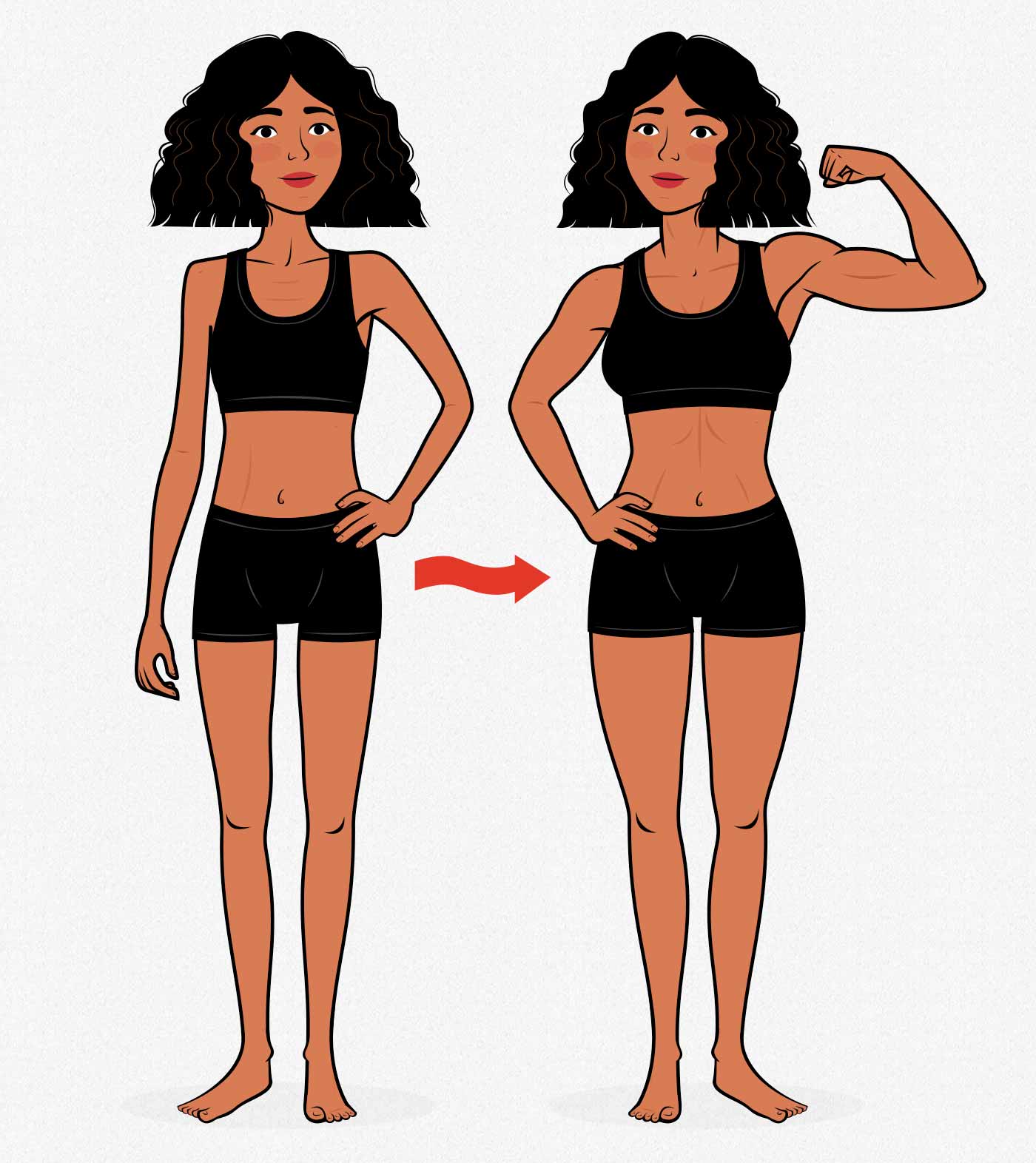
Why Take A Weight Gainer?
It’s common to have trouble gaining weight, ask for advice, and be told, “Just eat more!” But if you’re naturally thin, you’ve probably heard that before. “Just eat a burger.” Obviously, that doesn’t help. We need methods, not platitudes.
Hearing “just eat more” sucks because eating enough calories to gain weight can be incredibly hard. Yes, most people gain weight easily. Yes, most people can “just eat more.” But skinny women often have smaller stomachs, faster metabolisms, and more meagre appetites.
Plus, eating more real food means cooking more real food. Sometimes that can take too much time or energy, especially if you can’t fit much food in your stomach.
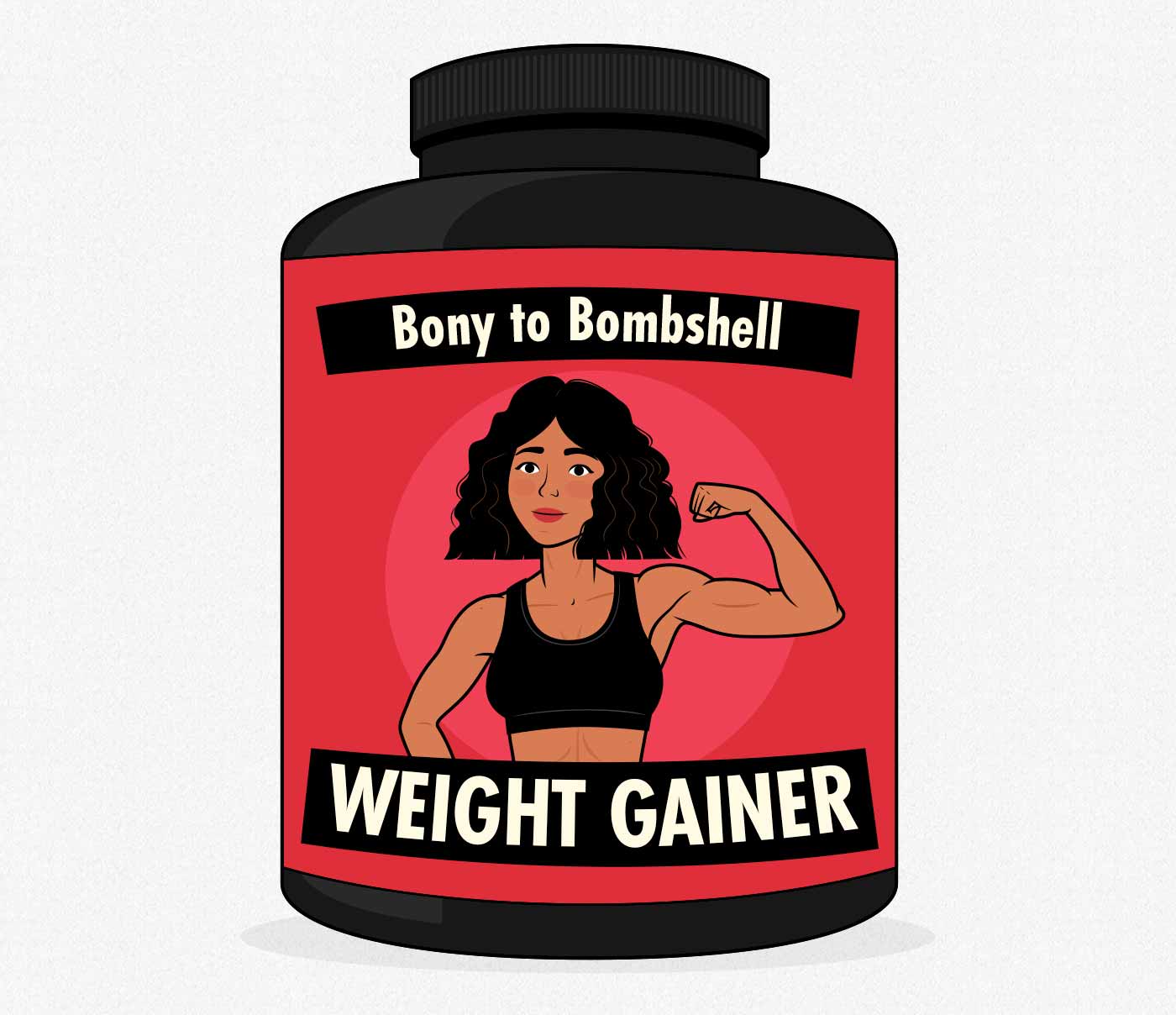
The selling point of weight gainers is that they aren’t as filling as real food, making it easier to eat more calories. And mixing some powder into water isn’t nearly as difficult as preparing a real meal—not to mention the dishes! These are real selling points.
For more, we have a full article on why it’s so hard for thin women to gain weight.
Do Weight Gainers Work?
Weight gainers do work. To gain weight, you need to eat more calories than you burn. Weight gainers contain a ton of calories. You’ll gain weight if those calories drive you into a calorie surplus.
Most women aren’t just trying to gain weight, though—they’re trying to build muscle. Weight gainers can help with that, too. Most weight gainers contain at least one serving of protein (27 grams) and often more (50+ grams). We build muscle out of the protein we eat, so eating enough protein can help us gain more muscle, less fat.
To maximize your rate of muscle growth, you need around 0.7–1 gram of protein per pound bodyweight per day. So if you weigh 100 pounds, you should eat at least 70–100 grams of protein daily. Weight gainers can help with that, as can protein powders.
Weight gainers also contain a ton of carbs. It’s common for overweight people to avoid carbs. And foods that are higher in carbs can indeed be easier to overeat. Soda pop is an infamous example of that.
The thing is, carbs can also be incredibly helpful for building muscle (full explanation). Our muscles store carbs in the form of glycogen, and that glycogen makes our muscles fuller and stronger (study, study). The Journal of the International Society of Sports Nutrition recommends getting around half of our calories from carbs when trying to build muscle (reference).
So by combining protein, carbs, and calories, weight gainers can help you gain muscle, strength, and weight, especially if you’re using them while following a good workout program.
For more, we have a full article on how to eat a good bulking diet. You can also encourage better recovery after lifting by having weight gainers as a post-workout shake.
What Results Can You Expect From Weight Gainers As A Woman?
In a 2002 study by Rozenek et al., the participants were put on a weight-training program to stimulate muscle growth. Some were given a weight gainer, some were given carbohydrate powder, and some weren’t given anything.
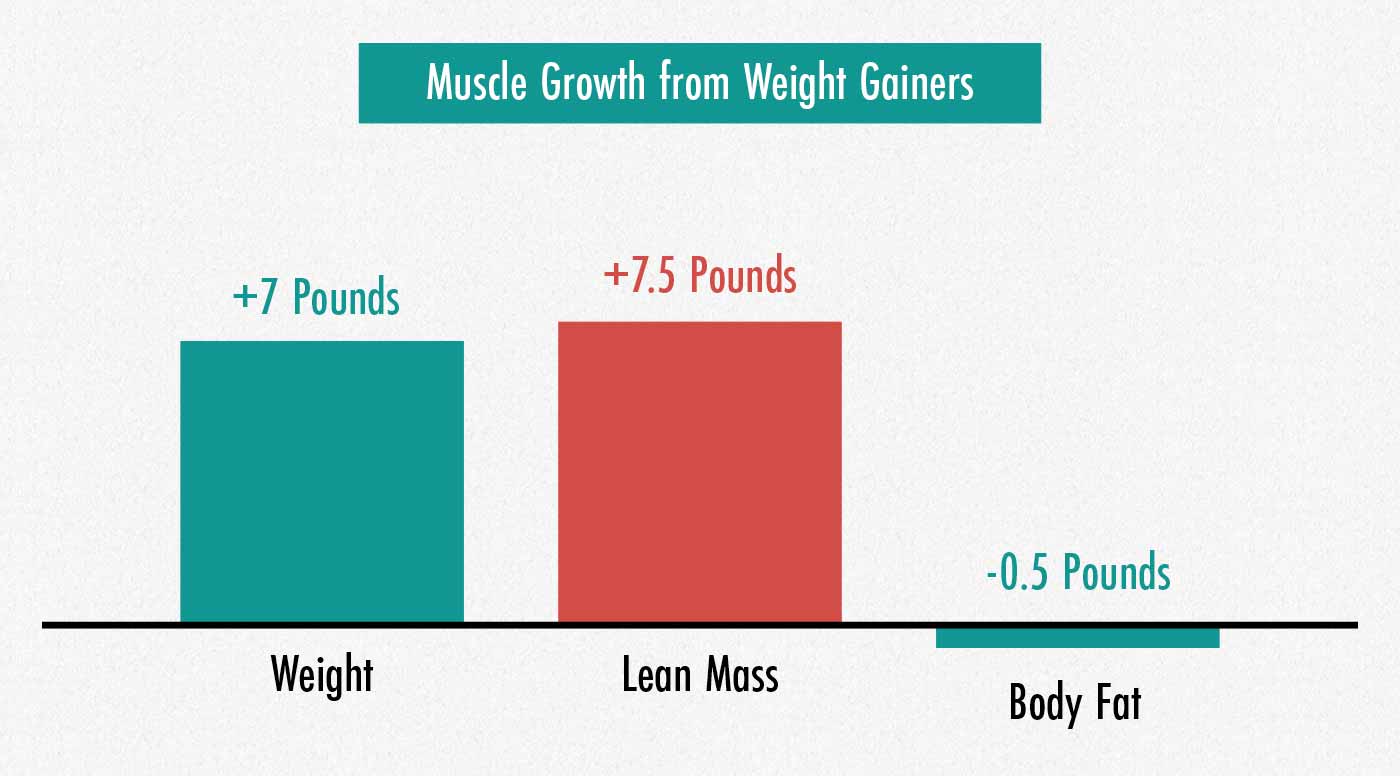
The participants supplementing with weight gainers were able to gain 7.5 pounds of lean mass while losing half a pound of fat, resulting in 7 pounds gained overall. The study was eight weeks long, so the weight gainer helped them gain about a pound per week.
Mind you, the participants in this study were men. As a woman, you’d probably want to cut that rate of weight gain in half.
Gaining around 0.5 pounds per week tends to work better for skinny women trying to build muscle. If you do that, it’s reasonable to expect about half the results shown in the above study. So around 3–4 pounds of muscle in under two months.
We see weight-gain results like that all the time. If you’re thinner, you can expect to gain muscle faster. If you’re naturally leaner, you might not need to worry as much about gaining fat. And if you’re new to lifting, you can expect a period of fast muscle growth when you first start weight training.
Are Weight Gainers Healthy For Women?
The thing is, to get results as we’ve shown above, you don’t need to take weight gainers. Weight gainers are just a source of protein, carbs, and calories. You can get those nutrients from anywhere. And if you get more of your calories from unprocessed whole foods, you’ll be getting more vitamins, minerals, fibre, probiotics, and phytonutrients. You might make slightly better progress without the weight gainer.
There’s nothing inherently unhealthy about the ingredients in a weight gainer. Gainers are just a mix of:
- Protein powder, usually whey protein concentrate or a plant-based alternative. Protein powders are a great source of protein for building muscle.
- Carbohydrate powder, usually maltodextrin. This is the more controversial part. Should you be supplementing with hundreds of calories of processed carbs? It’s hard to say. If your diet is really good, then you’re getting your micronutrients elsewhere, and so it’s not necessarily a problem. You could count this as a dessert. (Some weight gainers also use ground oats, perhaps a healthier option. Just watch out not to overdo it. Too much fibre can be hard to digest.)
- Flavourings, either artificial or natural. Maybe some cocoa and sucralose and a few other ingredients that probably won’t have much impact on your health when used in moderation.
If you can manage it, though, blending some weight-gain smoothies might be a healthier approach. You’ll get just as much protein and just as many calories, but you’ll also get more vitamins, minerals, fibre, probiotics, and phytonutrients. Blending up some bananas, oats, spinach, greek yogurt, and frozen berries with water works great. And then just add a scoop of whey if you need extra protein. That’s how we get results for the women doing our weight-gain program:
Choosing The Best Weight Gainer Supplement
We don’t personally use weight gainer supplements anymore. But they helped us at the time, and maybe they’ll help you, too.
When we first started trying to build muscle, we bought pre-made weight gainers (like QuickMass or Serious Mass). Then we improved on that by mixing our own weight-gaining supplements. We would buy a flavoured whey isolate powder and mix it with a carb powder (like maltodextrin). That gave us more control over how many grams of carbs and protein were in our weight-gainer shakes.
Then we improved on that by making homemade smoothies. They’re a bit harder to make, but they’re much more nutritious. (More on that in a second.)
Look For A Short Ingredient List
If we were in the market for a weight gainer supplement, we’d be looking for:
- Whey Isolate Powder (seems easier to digest than whey concentrate)
- Maltodextrin or powdered oats
- Minimal additives, sweeteners, thickeners, and preservatives
3 Solid Weight Gainer Supplements As Options
Here are three weight gainer supplements with decent ingredients that you could investigate further:
How to Use a Weight Gainer
As a rule of thumb, we recommend getting around 80% of your calories from minimally processed foods. Most foods are processed to some degree, and you don’t need to be super strict about it. Think of foods like fruits, veggies, legumes, meat, poultry, fish, dairy, nuts, seeds, yogurt, kefir, extra-virgin olive oil, eggs, and so on. Get most of your calories from foods like that.
The problem with weight gainers is that they’re incredibly processed. A single serving of Serious Mass by Optimum Nutrition contains 1250–1500 calories, almost all heavily processed. That’s probably around half your calories for the day, even when gaining weight. That’s too many processed calories.
Weight gainers have such enormous serving sizes because they’re made for men. Men are larger and burn more calories. And when men try to gain weight, they can do with a calorie surplus twice as big. And even for men, we don’t recommend taking full servings of weight gainers.
For women, we recommend cutting the serving size in half. Aim for 500–600 calories per serving instead of 1250-1500. You could take the weight gainer if you don’t have access to a proper meal. You could also take it after working out. You don’t need to take it every day. Just use it when you need it.
The Best Weight-Gainer Is A Homemade Smoothie
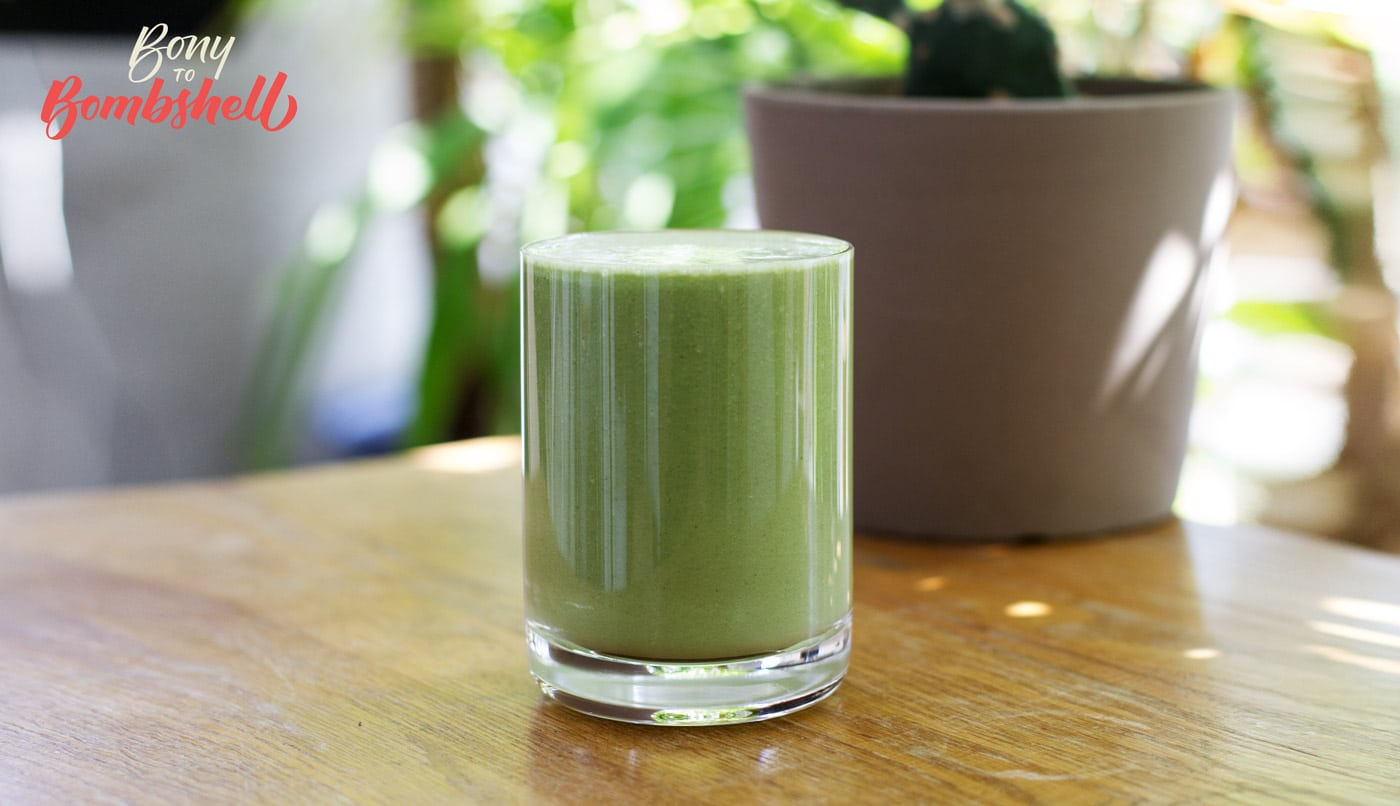
Smoothies are one of most nutritious weight-gain meals imaginable. They’re filled to the brim with protein, carbs, healthy fats, fibre, probiotics, fibre, and micronutrients. That’s why we recommend making weight-gain smoothies instead of using premade weight-gainer supplements. You can get creative with your smoothies, too, such as making a homemade egg-nog recipe.
Weight gainers can be handy in a pinch, and I’ve used them to gain weight in the past, but it’s hard to beat smoothies for healthy weight gain and muscle growth.
Sample Weight Gainer Smoothie:
- 225ml of milk (ideally grass-fed raw that’s been tested) or plant-based milk
- 1 banana
- 1 tablespoon of almond butter
- 4 frozen strawberries
- 1 scoop of unflavoured protein powder
- A handful of fresh spinach (if uncooked greens agree with your gut)
Once it’s blended fully and smooth, add one scoop of whey isolate powder or plant-based protein powder. Like a weight gainer from supplements, it’ll be easy on your appetite. But it’ll be made of mostly whole foods that will help you feel and look better.
GET THE sample PDF recipes OF THE
weight-Gain Muscle-building Smoothies
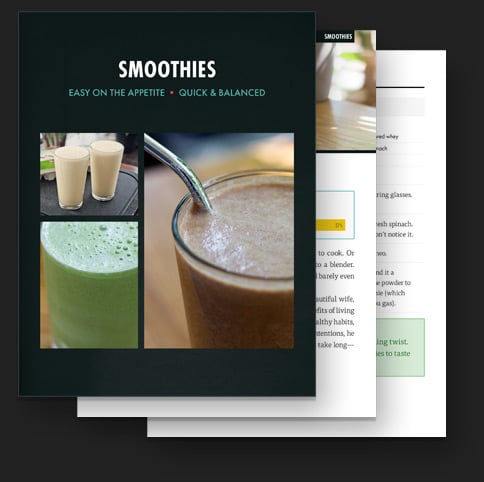
Get some sample smoothies recipes in a downloadable PDF file. Get the full explanation, ingredient list, macros, and steps to follow.
Plus, we’ll make sure you’re on the Bony to Bombshell newsletter, and send you all of our best women's muscle-building content.
The Verdict
Weight gainers do work for women, but they aren’t the only way to gain weight or build muscle. The main takeaway is that you can gain weight by:
- Following a good lifting program. Ideally, one designed to stimulate muscle growth and one specifically designed for women.
- Eating enough protein to build muscle. Eating at least 0.7 grams of protein per pound bodyweight per day
- Eating enough calories to gain weight. Eating around 250 extra calories per day will help you gain around half a pound per week. You’ll then need to adjust your intake based on how much weight you gain on the scale each week.
- Getting enough sleep. Getting proper sleep will improve your willpower, energy, and muscle growth. And it can help limit fat gain while gaining weight.
If you’re doing those four things, you’ll do a great job of building muscle. Weight gainers can help you eat enough protein and calories, so they can indeed help you build muscle. But there are many other ways to eat enough protein and calories.
What Next?
If you liked this article, I think you’d love our muscle-building newsletter. We’ll keep you updated on all the latest muscle-building information for women. Or, if you want us to walk you through the process of building muscle, including teaching you the lifts, giving you an entire workout program, a complete diet guide, a recipe book, and online coaching, check out our Bony to Bombshell Program.

